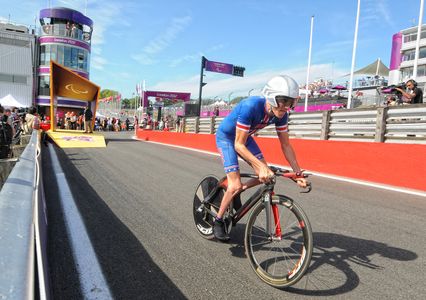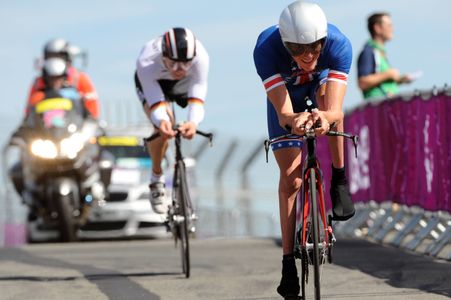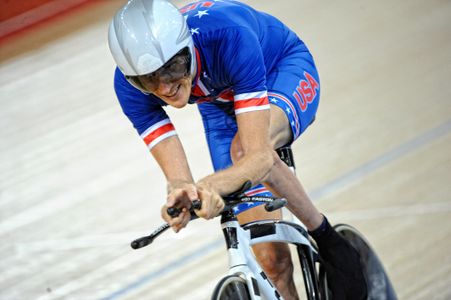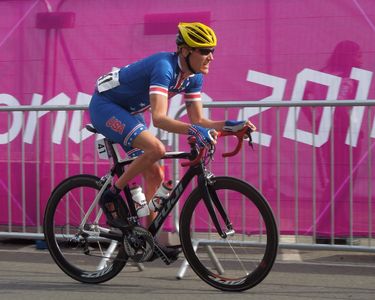Anthony Zahn
 Anthony Zahn was a bronze medal-winning Paralympic cyclist who had many hobbies and passions and is remembered for his desire to help others.
Anthony Zahn was a bronze medal-winning Paralympic cyclist who had many hobbies and passions and is remembered for his desire to help others.
During his life, he voiced his interest in brain donation and upon his death, his family donated his brain to the BU CTE Center. We thank the Zahn family and his wife, Liz Bernstein, for their generous donation and commitment to our research.
Read Anthony’s story below.

Anthony Zahn was the oldest of four siblings. He had two brothers and a sister, including his brother Patrick, who shared his passion for cycling. The two raced together, attended several Carpenter Phinney cycling camps, and traveled the world riding bikes. Anthony was passionate about anything bike-related, including bike mechanic and frame-building school.
“Anthony was lucky to have been able to turn his hobby and passion into a career and opened a bike shop when he was 22 years old, which he had for 14 years,” his wife, Liz, shared. His passion for cycling would lead him to compete at the Paralympics in 2008 and 2012, becoming a medal-winning Paralympic cyclist.

As a kid, Anthony loved sports and tried many of them, including football, diving, swimming, and wrestling. Outside of sports, he had various hobbies, like ceramics, and enjoyed collecting art and paintings. He also collected coins, watches, knives and swords, and bikes and bike clothes, including an impressive collection of over 100 jerseys. Nothing compared to his love of cycling.
From the time he was fourteen, Anthony lived with a disease called Charcot-Marie-Tooth (CMT), which is a motor and sensory neuropathy affecting the peripheral nerves. It caused him to have difficulty walking and using his hands.

“He lived a hard life with CMT,” Liz said. “Nothing was easy for him and while most of what people see about it is that it’s hard to walk or use your hands, it also caused him a lot of pain with nerve loss, fatigue, and constantly injuring himself (breaking a toe or twisting an ankle).”
Anthony first learned about the Paralympic team in 2005 when he realized he wouldn’t be able to be a Tour of France cyclist. “He quickly got classified and made the US Paralympic Cycling team in 2006,” his parents said.
 He went on to earn a bronze medal in the Time Trial in Beijing and eventually retired from cycling in 2014. Anthony stayed involved with cycling as a coach and a mentor.
He went on to earn a bronze medal in the Time Trial in Beijing and eventually retired from cycling in 2014. Anthony stayed involved with cycling as a coach and a mentor.
During his life, Anthony experienced at least 12 documented concussions. Before his last experience in the Paralympic Games, his doctor had warned him that he couldn’t hit his head again.
Anthony felt the impact of these concussions in several ways. He had difficulty reading longer stories because he had trouble remembering what he had read prior and he opted to read magazine articles instead of books. He couldn’t be in loud spaces or places with moving lights for long and had difficulty keeping jobs that required memorization of certain tasks, for example, computer-related work.
 During his lifetime, Anthony suspected he may have CTE and upon his death from pancreatic cancer in 2020, his family honored his wishes to donate his brain to the BU CTE Center. “It’s great that the research is being done to help others,” they said.
During his lifetime, Anthony suspected he may have CTE and upon his death from pancreatic cancer in 2020, his family honored his wishes to donate his brain to the BU CTE Center. “It’s great that the research is being done to help others,” they said.
Anthony was ultimately not diagnosed with CTE, but there were changes noted in his brain, such as vascular disease, multiple subacute infarctions, and a remote microinfarction.
His family acknowledges they were disappointed that he didn’t have CTE after Anthony thought he did, and they stress the seriousness of head injuries. “Head trauma is serious. You only get one brain and it’s not something that can easily be repaired with surgery like other body parts,” his family said. “Take time to recover from injuries.”

They remember Anthony as always wanting to help others, whether it be fellow individuals with CMT, traumatic brain injuries (TBIs), or others in the para-athlete and coaching communities. In addition to donating his brain, Anthony donated his body to research at the University of California, San Francisco (UCSF).
“I have been working in disease-related jobs for over 15 years and know the importance of research and what it can do for people,” Liz said.
His family continues to share and honor his legacy by holding an annual memorial ride to raise money for the CMTA organization.
 Fans can visit an exhibit about Anthony that is on display at the Olympic and Paralympic Museum in Colorado Springs. It opened in 2022 and will be on display until the summer of 2025.
Fans can visit an exhibit about Anthony that is on display at the Olympic and Paralympic Museum in Colorado Springs. It opened in 2022 and will be on display until the summer of 2025.
“He was loved by people all over the world for being an international cyclist,” his family said.
Anthony’s diagnosis was made by Dr. Russ Huber at the BU CTE Center. If you would like to support the BU CTE Center’s research and help give more families life-changing diagnoses, you can donate here.
If you or a loved one are interested in brain donation, please view our Frequently Asked Questions (FAQs) and brain donation brochures for more information.
You can visit our Resources page to find resources for anyone struggling with suspected CTE symptoms.
This story was written by Amanda V. Cabral at the BU CTE Center. If you are interested in having a donor story written for your loved one, please reach out to her at avcabral@bu.edu.